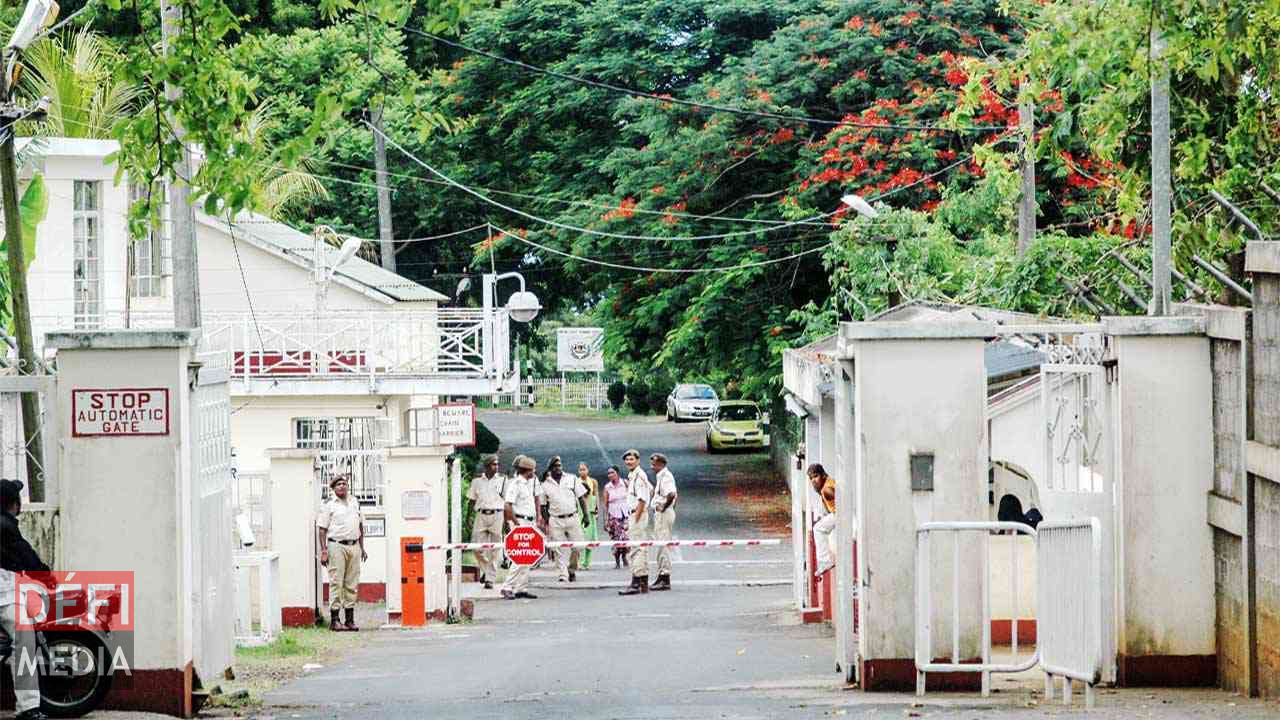
As revealed by Statistics Mauritius this week, the imprisonment rate per 100,000 mid-year population rose from 169 in 2015 to 177 in 2016. Also, with the number of fine defaulters sent to prison being on the rise, we question whether this is a key factor in the increase of prison population. Two social observers share their views with us on the issue.
Publicité
In 2016, the prison occupancy rate was higher compared to the precedent year. According to Statistics Mauritius, the average prison occupancy level in 2016 was 71%, with the highest occupancy level being 75%. In fact, the number of convicts admitted increased by 27%, from 2,907 in 2015 to 3,698 in 2016. Also, out of every 100 adult convicts sent to prison in 2016, 67 were re-offenders who had been imprisoned in the past.
However, the statistics also indicate that the number of convicts with short sentences of less than one month rose by 17% in 2016 and similarly, those sentenced for 1 to 3 months increased by 16%. Indeed the number of fine defaulters admitted to prison increased from 685 in 2015 to 1,091 in 2016. The admissions due to non-payment of fines of Rs 30,000 or less also rose by 61%, from 633 in 2015 to 1,018 in 2016. Are these short sentences the main factor explaining the huge rise in the number of convicts in our prisons? Raj Moothoosamy, from the Victims Support Mauritius and lawyer Erickson Mooneapillay share with us their views on whether detention in prisons and the law governing imprisonment should be reviewed.
Raj Moothoosamy: “The reviewing of the judiciary system should be a priority”
According to Raj Moothoosamy, the main aim of the Victim Support Mauritius (VSM) group is not to make any type of judgement on criminals. “We combat criminality by carrying out awareness campaigns. If we can identify the criminals and help them overcome their problems, it is better for us. I have done numerous prison visits. What I’ve noticed is that the government is doing nothing but reproducing criminals,” he argues.
 The member of the VSM explains that the convicts with short sentences should not be put together with other criminals. “Those who are sentenced for not paying their penalty fees and fines are most of the time seeing themselves together with seasoned criminals such as murderers or rapists. I trust that it is crucial for us to have segregation in our prisons. The fine defaulters should be separated from the other convicts for example those who have committed murders and those who are violent and dangerous.” Raj Moothoosamy agrees that the law governing imprisonment should be reviewed. “We see some people stealing millions but not being sentenced at any level while others stealing vegetables and herbs in plantations are sanctioned with years of prison. There is definitely something wrong with the judicial system,” he states.
The member of the VSM explains that the convicts with short sentences should not be put together with other criminals. “Those who are sentenced for not paying their penalty fees and fines are most of the time seeing themselves together with seasoned criminals such as murderers or rapists. I trust that it is crucial for us to have segregation in our prisons. The fine defaulters should be separated from the other convicts for example those who have committed murders and those who are violent and dangerous.” Raj Moothoosamy agrees that the law governing imprisonment should be reviewed. “We see some people stealing millions but not being sentenced at any level while others stealing vegetables and herbs in plantations are sanctioned with years of prison. There is definitely something wrong with the judicial system,” he states.
Commenting on the increase in prison population and the fact the 67 out of every 100 adult convicts are re-offenders, Raj Moothoosamy believes that there are various factors that are of the root of this. “Firstly, these re-offenders are used to the judicial system and the prison environment. They know how the system works and are not afraid of going back to prison. Secondly there is a feeling of frustration among the prison officers themselves. Due to this, they are unable to deliver in their work.” He trusts that the government should categorise criminals according to their offences. “We cannot put everyone in the same basket.”
Raj Moothoosamy believes that it is imperative for the government to do a follow up with the short-sentenced convicts. “These people are not like the other criminals. We must bear in mind that when they are imprisoned, it is the life of a whole family which is affected. Within the Mauritian context, there is stigmatisation which takes place. The family is also stigmatised as criminals and children are bullied at school. These convicts’ future are also affected as they are tagged as ‘not good’ or ‘not trustworthy’ people. The fact that they will not get a certificate of morality will greatly affect their work life.”
He also questions about what the government is doing to rehabilitate those types of convicts. The member of VSM trusts that a rehabilitation centre should be set up for them. He also questions about the rehabilitation programme with criminals who served many years in prison as well as re-offenders. “Where will a prisoner, who for example has served 20 years in prison, go following his release? They are left on their own once they step out of prison. There are no more assistance and follow ups done like before. This is why there are many re-offenders.”
Raj Moothoosamy states that the law and order, the judiciary as well as the security of the people should be the government’s priority. “The government should not wait for the situation to get worse to act,” he states.
Erickson Mooneapillay: “A real understanding of the causes of crime is essential”
The lawyer underlines that first of all one should understand crime in order to tackle it and to bring the appropriate solution. “Strictly speaking, a crime is an act forbidden by law serious enough to warrant some kind of punishment. I use the word punishment because society usually demands reparation or revenge for something that affects its ‘collective conscience’.”
 Commenting on the statistics regarding the fine defaulters, Erickson Mooneapillay explains that reforms do not takes place so easily. “The use of prisons can be traced back to early civilisations as a form of retribution rather than a means to reform. Some things never change. A one-week sentence cannot by any stretch of the imagination be enough to reform anyone. Likewise a 60-year sentence cannot be seen as a means of reform. It certainly ‘isolates’ the murderer from society but one cannot speak of reform in these cases especially when most murders in Mauritius emanate from intimate relationships, what we call passion crimes. Likewise one cannot state that the person cannot be reformed when there is no proof whatsoever that the ‘murderer’ would ever commit such crimes even if released after a week.”
Commenting on the statistics regarding the fine defaulters, Erickson Mooneapillay explains that reforms do not takes place so easily. “The use of prisons can be traced back to early civilisations as a form of retribution rather than a means to reform. Some things never change. A one-week sentence cannot by any stretch of the imagination be enough to reform anyone. Likewise a 60-year sentence cannot be seen as a means of reform. It certainly ‘isolates’ the murderer from society but one cannot speak of reform in these cases especially when most murders in Mauritius emanate from intimate relationships, what we call passion crimes. Likewise one cannot state that the person cannot be reformed when there is no proof whatsoever that the ‘murderer’ would ever commit such crimes even if released after a week.”
He trusts that long prison sentences do not discourage future criminals. “Does the punishment of one offender deter the other? The idea that if A is sent for a long sentence B will be discouraged of committing crime is a foolish fallacy. The direct result if any on B will make him scared and prudent in committing his crimes. But the criminal mind is still present and given the right circumstances he will act on it.”
Erickson Mooneapillay also trusts that passion and sex crimes should be differentiated from property crimes like larcenies, burglaries etc. “These offences form the bulk of our penal code and are often committed by young adults. They often lead a life of crime because of their upbringing and their environment. Human beings respond to outside stimuli. We are the product of what we see. The causes of many of the property crimes are often poverty, drugs and promiscuity.” He explains why the number of re-offenders is high. “Unfortunately, given the same stimuli the exact reproduction of these crimes will happen over and over. This is why are so many ‘repeaters’ in such crimes. Prisons have not been able to break the vicious circles.”
He further adds that long sentences without remission have the negative effect of making criminals idle. “An idle mind is a dangerous mind. They again learn the rules and become masterminds either in prison itself or when they are out.” He trusts prison is the last place where criminals such as drug users should be. “And despite the fact that our legislations cater for what we term a rehabilitation order, I have never come across any sentence where a magistrate has sent a drug user to a rehabilitation centre,” he states.
But does be believes that the law regarding imprisonment should be reviewed? “I will argue that many of people imprisoned for longer sentences do not pose a direct threat to society. Someone who has killed in an accident cannot be a threat if the license is suspended/cancelled. Likewise a woman who killed her husband after having being ill-treated cannot be a threat to all men. The reason those people are behind bars is purely revenge. The family of the victims are angry (rightly so) and demand punishment. But punishment cannot tantamount to justice. Reform, reparation and forgiveness are the true hallmarks of justice. True it is that the sentences meted out are many times incomprehensible because many fall in to passion.”
Erickson Mooneapillay is more of the view that the understanding of the causes of crime should be understood by those in the criminal justice system instead of reviewing the system itself. “The criminal is a ‘patient’ too. Something has gone inherently wrong in his metabolism that made it difficult to learn the rules of society. He therefore broke them. He needs a ‘hospital’ to repair the wrongs. That is what we call reform. For there to be real justice and humanity in the treatment of criminals, a real understanding of the causes of crime is essential for everyone in the criminal justice system.
Court orders son to return land to mother
Justice Gaytree jugessur-Manna sitting at the Supreme Court Civil Division has recently ordered the son, Lallmun Toory, defendant No 1 and his wife Sita Bhoyrub, defendant No 2, to return to his mother and her mother-in-law respectively, Premjoly Toory born Bhungee, the plaintiff, the portion of land of an extent of 309 square metres she allegedly sold for Rs 285,000 when in fact this sale was a "disguised donation" and this for reason of "ingratitude" shown toward the mother and mother-in-law. In his Plaint with Summons dated 20 May 2009, the plaintiff contends that the alleged sale in the said title deed was a donation in as much as the son never paid the sale price of Rs 285,000 and the sale was done solely to confer an aura of regularity of title of ownership of the subject property to the first defendant. It is also averred in the plaint that after the transfer of the subject property in the name of the defendant No 1 both defendants (husband and wife) misbehaved, ill-treated and threatened the plaintiff. Their conduct and behaviour amounted to an act of “ingratitude".

The plaintiff is praying for a judgment: (a) decreeing and declaring that the deed drawn up by Public Notary, Mr André Guy Joseph Le Blanc, dated 13 February 2004 duly registered and transcribed in Vol 5427 No 39, is in fact and in truth a disguised donation made by the plaintiff to his son; (b) decreeing that the defendant No 1 has been guilty of conduct and misbehaviour which constitute "ingratitude" and consequently the donation made by the plaintiff No 1 of the portion of land under reference should be rescinded and (c) ordering the co-defendant, the Conservator of Mortgages, to make the necessary margin entries in his books and registers relative to the said deed drawn up by the Notary Public dated 13 February 2004 duly registered and transcribed in Vol 5427 No 39.
The first defendant did not resist the plaint and agreed to the above prayer. As averred in her plea, the second defendant, the wife, contends that she and the first defendant paid the sum of Rs 285,000 cash to the plaintiff as the sale price for the land in lite. The first defendant allegedly used his lump sum of Rs 300,000 which he received from the Corporation Nationale du Transport (CNT) and they both took a loan of Rs 100,000 to pay the plaintiff. She also denied having misbehaved with the plaintiff. In cross-examination, the plaintiff stated that she was 75 years old and illiterate. She testified that she has three children and two of whom are abroad. Defendant No 1, her son, resided in a rented house with his unemployed wife and five children. She felt pity for his son and his family and wanted to donate a plot of land to him to build a house. Public Notary Le Blanc whom she contacted advised her to proceed by a sale. On 13 February 2004, she sold to his son a portion of land at Riche Terre, Pamplemousses, but she never received any money from the two defendants in return. In November 2008 her son and daughter-in-law insulted and assaulted her. Her grand children also assaulted her. She reported the incident to the police.

Notre service WhatsApp. Vous êtes témoins d`un événement d`actualité ou d`une scène insolite? Envoyez-nous vos photos ou vidéos sur le 5 259 82 00 !


















![[Info Soirée] : «Nou ki kone ki nou pe viv»](https://defimedia.info/sites/default/files/styles/square_thumbnail/public/thumbnail_190424_final.jpg?itok=ecxAuRQE)
![[En images] Cérémonie de remise des insignes de l'Ordre de la Pléiade](https://defimedia.info/sites/default/files/styles/square_thumbnail/public/photo-2024-04-19-19-40-54.jpg?itok=XU-kkZR0)



